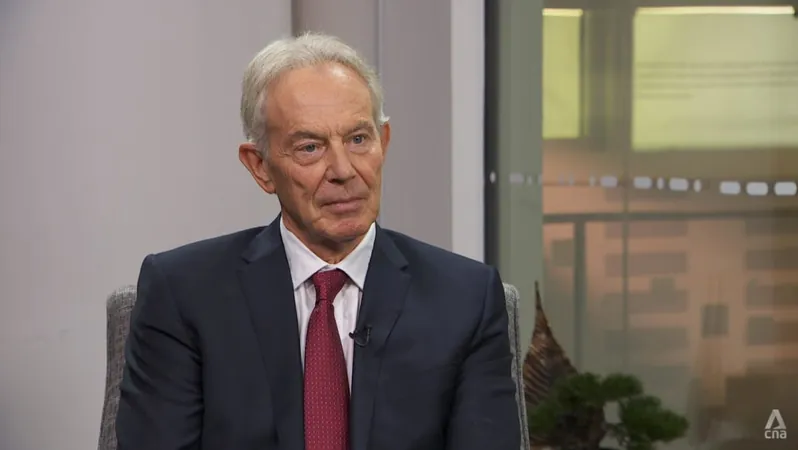
Tony Blair Insists: Path to Peace in the Middle East Is Still Within Reach Amid Growing Tensions
2024-09-20
Author: Mei
Former British Prime Minister Tony Blair has voiced his belief that, despite escalating conflicts in the Middle East, a resolution to the enduring war in Gaza is still achievable. Speaking to reporters in Singapore, Blair emphasized that while the situation is fraught with complications and risks of further escalation, the goal of peace remains attainable.
"It's extremely difficult, and there are real risks of escalation," Blair acknowledged, highlighting the prolonged and complex nature of the conflict. "However, I think it is still possible to bring an end to the war in Gaza and set a path forward for the future."
Blair noted the ongoing efforts to broker a truce between Israel and Hamas, which have seen multiple proposals rejected by both parties. Drawing from his eight years of experience as the Middle East envoy for the U.S., Russia, the United Nations, and the European Union, he articulated the fundamental needs of both sides: "Israel needs security, and the Palestinians need the hope of self-determination and ultimately, a Palestinian state."
The former prime minister pointed out that despite the challenges, there is consensus on the necessary steps for peace. He argued that without addressing both the security concerns of Israel and the aspirations of the Palestinian people, the cycle of violence will continue. "If you want peace, you've got to find the right constructive agreement that lets you get there," he said.
Referring to his involvement in the Good Friday Agreement, which ended decades of conflict in Northern Ireland, Blair explained that although the Israeli-Palestinian issue is "a lot more complicated," the essence of peace-making remains similar: satisfying the critical needs of both sides to create a workable solution.
Amid the growing tensions spurred by recent explosions in Lebanon, allegedly linked to Israel’s operations against the militant group Hezbollah, Blair reiterated the urgency of addressing the political landscape in both Israel and Palestine. "You're never going to get peace unless the politics of both sides change," he warned.
In addition to discussing the Middle East, Blair also addressed broader geopolitical considerations, particularly the importance of maintaining diplomatic relations with China. He asserted that isolating China would be counterproductive, especially given global challenges like climate change and public health that require cooperation among major powers.
"The relationship between China and the US is the biggest question for geopolitics in the 21st century," he stated, underscoring the need for strong allies to navigate the complex dynamics between China and the West.
As tensions rise and the stakes grow higher, Blair's assertions serve as a reminder that the road to peace, while steep, is not entirely closed off. The critical need for dialogue and understanding persists, urging leaders to take decisive steps toward a lasting resolution.

 Brasil (PT)
Brasil (PT)
 Canada (EN)
Canada (EN)
 Chile (ES)
Chile (ES)
 Česko (CS)
Česko (CS)
 대한민국 (KO)
대한민국 (KO)
 España (ES)
España (ES)
 France (FR)
France (FR)
 Hong Kong (EN)
Hong Kong (EN)
 Italia (IT)
Italia (IT)
 日本 (JA)
日本 (JA)
 Magyarország (HU)
Magyarország (HU)
 Norge (NO)
Norge (NO)
 Polska (PL)
Polska (PL)
 Schweiz (DE)
Schweiz (DE)
 Singapore (EN)
Singapore (EN)
 Sverige (SV)
Sverige (SV)
 Suomi (FI)
Suomi (FI)
 Türkiye (TR)
Türkiye (TR)
 الإمارات العربية المتحدة (AR)
الإمارات العربية المتحدة (AR)